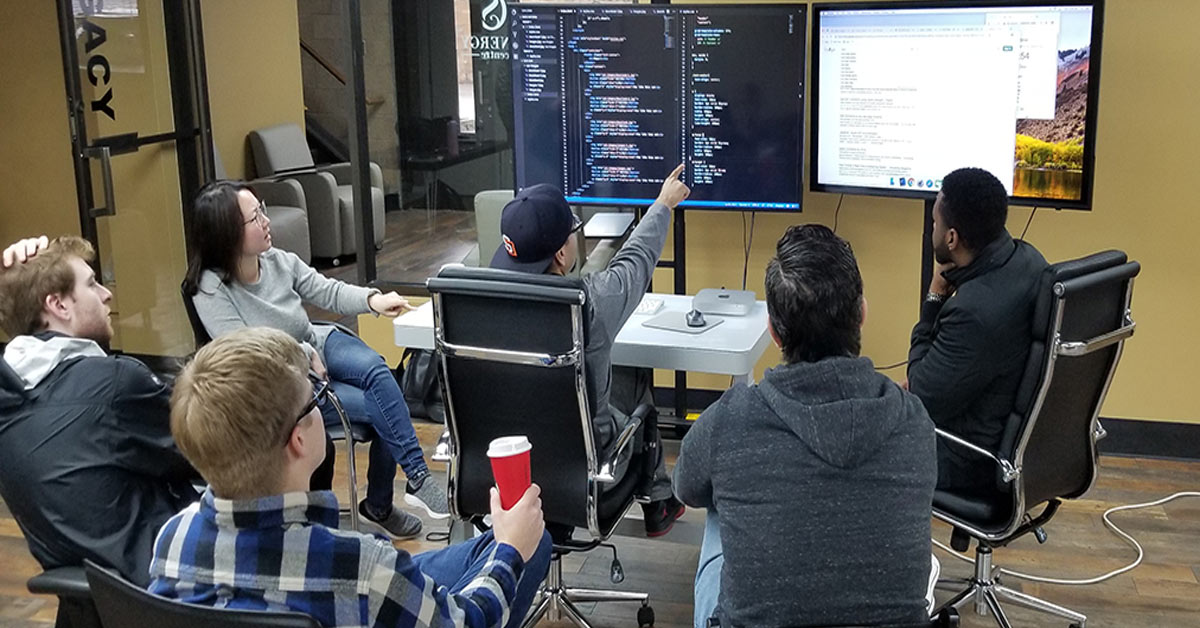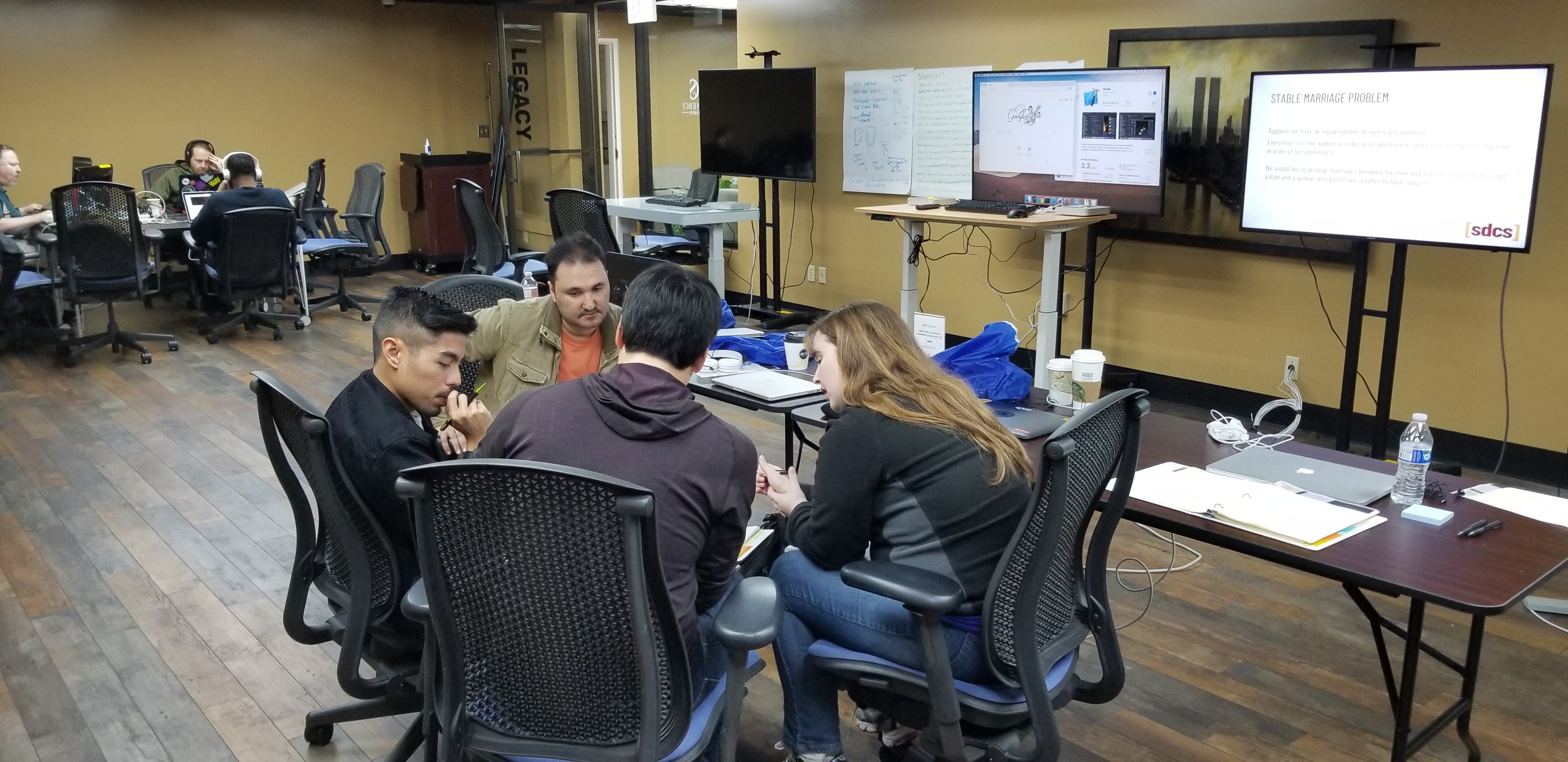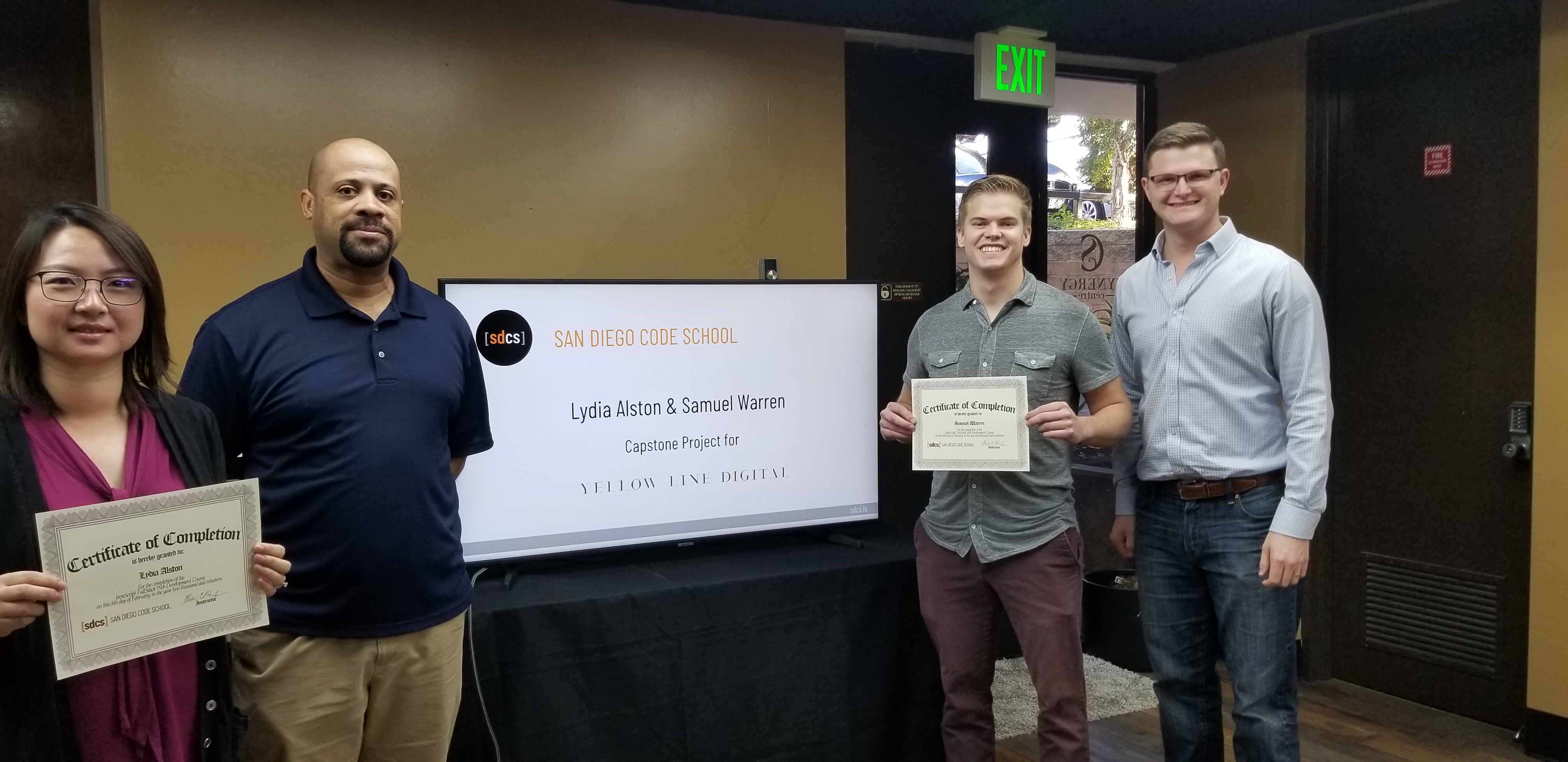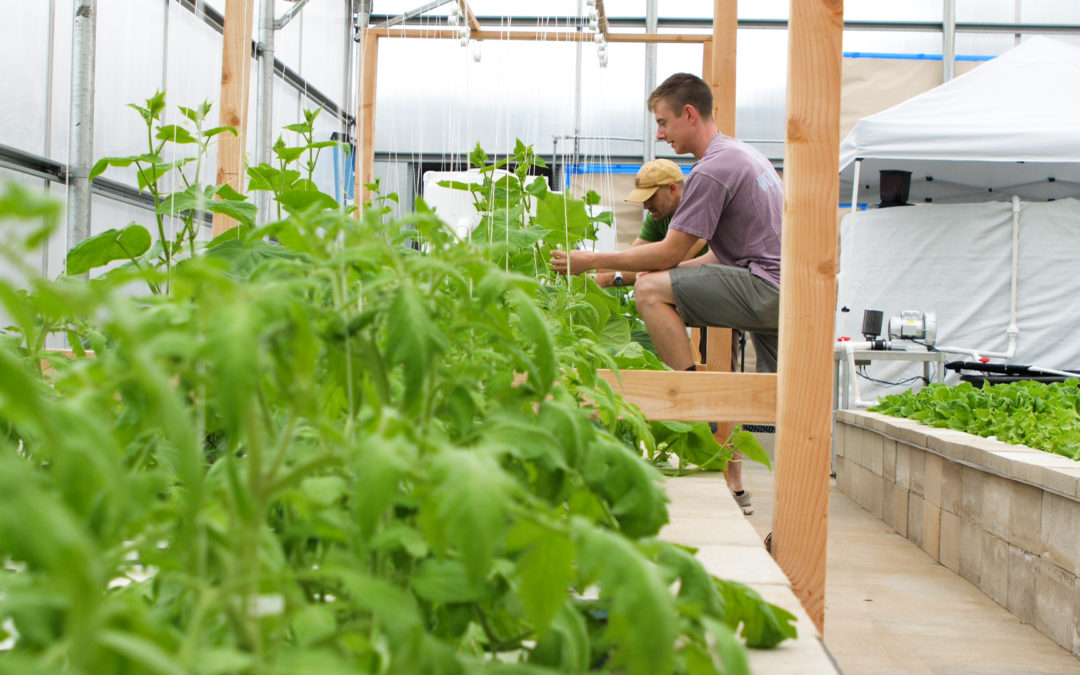San Diego Code School
Institution Sets up Shop in Escondido Coworking Space
From creating and maintaining systems to building new apps and infrastructures, software engineers can be found at nearly every company these days across every industry. And, with the rise of virtual reality, AI, and mobile and smart technology such as the Internet of Things, software engineers are at the forefront of some pretty exciting developments that promise to transform businesses. In fact, the U.S. Bureau of Labor Statistics predicts that there will be around 1.4 million more software development jobs in the country than applicants who can fill them in 2020. Institutions and other tech education programs can't seem to produce job candidates fast enough, resulting in the emergence of more coding schools, including one in Escondido.
 San Diego Code School students often collaborate on projects together
San Diego Code School students often collaborate on projects together
Founded in September 2018, San Diego Code School (SDCS) provides its students with a 16-week program that prepares them for careers as developers. The Escondido-based school was founded by Michael Roberts Jr who has over 30 years of coding experience under his belt and has helped launch over 100 careers, including ones in the local tech ecosystem. SDCS provides students not only with the knowledge they need to become successful developers but also with guidance in the job search process that ensues. As the school's website states, "We are fully prepared to take you from step 1 to job-ready. Every part of what we're teaching is directly related to getting your first developer job, helping you with the search process, and making sure you succeed. We work harder than anyone to get you into the software industry."
When SDCS officially began operating in October, the school was entirely remote. Today, the school operates out of Escondido's Synergy Centre coworking space, which is at the heart of downtown, making it within walking distance to coffee shops, restaurants, and more. The flexible program - which has the time commitment of a full-time job - gives students the option of working from home or onsite. "You could potentially work part-time but you wouldn't be able to hold a full-time job and go through this program. It's very intense," Roberts said.
The coding school has already graduated a cohort of students since beginning enrollment in October, and with rolling admission, plans to have graduates every few weeks moving forward.
Location is Key: When first figuring out where to base the school, Roberts looked into locations around the region, thinking a central location in San Diego County would be ideal. After weighing the pros and cons of that, the team saw a lot of risk in starting out at what had the potential of being the wrong location for SDCS. "The coworking spaces at were available were not nearly as good as the opportunity that we had here at Synergy. We've been able to interact with some of the other local businesses in the coworking space and it just really felt like a smaller, more welcoming, and more inclusive environment when we came in and had a tour. It's a beautiful building and facility. It just checked all the boxes," Roberts said. "Our plan was just to stay here for a short while until we figured things out, and it just has grown on us to the point now where I don't envision us ever leaving Escondido, and this really seems like a permanent home."
Working at Synergy Centre has not only been a positive experience for SDCS to start, but also an excellent place to grow. "It's been awesome. We started with a small space and it fit our needs at the time. Now we've been able to expand into the space downstairs, which has provided us a way to quickly transition the business into the space that we need to grow for the future. It's been super awesome in terms of flexibility," Roberts said, adding that the versatility of the coworking space has allowed the business to expand its office while remaining in the same space.
"It's also turned out to be an ideal location, being in North County," Roberts said. He initially thought the school would only operate there temporarily before relocating to a more central location like Mission Valley after a few months. However, after finding success in Escondido, the choice to start there has proven successful.
"We found a good number of students who either live in Escondido or really prefer the fact that we're in a place that is serving a different market," Roberts said. "This gives us a good position to reach businesses that are in this area. The location and the ability to get started quickly in Synergy Centre has been super helpful."
 Students of all knowledge levels and backgrounds are welcome to join the 16-week program at SDCS
Students of all knowledge levels and backgrounds are welcome to join the 16-week program at SDCS
Hands-on Learning: As part of the coding program at SDCS, students are able to gain hands-on experience by working on a coding project for a real-life company. "We're always looking for companies that have maybe an MVP (minimum viable product) or something that they're not able to get greenlit, even if they're a large company," Roberts said.
SDCS reaches out to businesses and offers its services to see if it could be a mutually beneficial project for both the students and the company. "We typically have a few projects for the students to pick from. They then iterate on it, build it for four weeks, and then hopefully deliver some value," Roberts said.
The real-world projects SDCS students work on deliver some sort of functionality to the company and, according to Roberts, "It's something that will be in production, so it's going to be built to production-grade. It's going to be accessible to the public." One of their practice clients is Yellow Line Digital, which operates out of a neighboring office inside Synergy Centre. "We told them if there was something they could identify for us to build that we'd be more than happy to do it. It just turned out that it was a great fit. They have a need for a portal for their customers, and so, the first group (of students) went through and built that first portal," Roberts said. "We've actually had a couple of different groups pick up the project and take it just a little bit further. And that's not atypical; I've done that in the past with other students."
Escondido Tech Scene: The fast-evolving tech scene in Escondido has been changing the game for local startups like SDCS. "Just recently - especially with the San Diego Tech Hub - there's becoming an increased awareness that there are a lot of engineers who work remotely in Escondido or are working on small startups. And now, with Synergy being here, there's another place for people to come together and have those serendipitous connections where you'll bump into someone and you'll be able to make that natural connection that you might otherwise not be able to make," Roberts said. "We're only in the early stages of businesses discovering what's been going on in North County and how they can best work together and collaborate on things. The more we can connect our initiatives, like with the ones through San Diego Tech Hub and Innovate78, is going to really be helpful."
One of the ways SDCS bridges that gap as an institution is by constantly reaching out to companies and inviting them to attend its job fairs and connect with some of its students. The school also encourages companies to consider creating entry-level roles to offer opportunities to people who come from a non-traditional education background.
"We can be a unifying force in the community by being a place for people to come together for job fairs or demo days, or watch our students pitch projects, and start building a more tight ecosystem around people entering the marketplace and the workforce. There's a lot of talent and oftentimes, startups need some more senior talent, but they could also be places where people early on in their career can have the opportunity to touch a lot of things at a startup and get a lot of experience that they might not otherwise get with a larger tech company," Roberts said.
 The school plans on having graduates every few weeks moving forward, providing them with help in their job search
The school plans on having graduates every few weeks moving forward, providing them with help in their job search
Inclusive Institution: Students of all sorts of backgrounds are encouraged to attend SDCS. Anyone who has the desire to work in software is welcome to enroll. The school has a diverse group of students. Roughly a third of the institution's students are seeking to change their careers. "They may have identified that they're just not happy in their career or that they don't see a step up from where they are. Once they identify that, they're usually looking to transition to a space where there will be those opportunities," Roberts said. About another third of SDCS students range from eighteen-year-old high school graduates to individuals in their mid-twenties who are going through the program currently until they are certain about whether they want to go to college. The remaining third of SDCS students are veterans who want to return to San Diego. "We see a lot of returning vets that are entering the job force and they just know that there are a lot of tech careers and that this would be a good place to jumpstart their careers," Roberts said.
The school's first graduate actually was a veteran who served in the U.S. Marine Corps. "He did a little bit of work in finance as a compliance officer, and he took the program and recently got a job with Red Hat. He's making $80,000," Roberts said, adding the hefty salary comes from a mere $2,500 investment in the 16-week program at SDCS. "To have that significant of a jump in salary is a true testament that these kinds of programs can work and large companies like Red Hat are willing to hire these graduates," Roberts said.
The many satisfied graduates of the rigorous program have gone on to work at local companies like Ezoic, MindTouch, Nixon, and Galley Solutions. SDCS graduates have also left a number of testimonials on the school's homepage. One student writes that "Michael went out of his way to help me in my career transition and advanced learning above and beyond the scope of the course. He was encouraging and supportive during a stressful time." Another student shares that Michael is "great at getting things organized, leading a team of developers, and explaining difficult concepts to others."
Prospective students can get started right away and are encouraged to tour the office to get a feel for what they do at San Diego Code School.
You can also keep up with San Diego Code School on Facebook and Twitter.
Subscribe to "Escondido Insight" to receive more stories like this delivered monthly to your inbox.
2019 City Council Awards
Downtown Escondido Well-Represented Among Award Winners
On February 27, hundreds gathered at the California Center for the Arts for the annual State of the City Address and City Council awards.
Each year, the council recognizes individuals who have made significant contributions to improve the quality of life in Escondido through volunteer service. The city accepted nominations from the public, and a council subcommittee composed of John Masson and Michael Morasco narrowed down the nomination field to the group of nine winners.
This year, four of the nine honorees were businesses or business owners - William Toone of ECOLIFE Conservation, The Grand Tea Room's owners, Louisa and the late Bob Magoon, local landscape architect Glen Brouwer and Henry Avocado Corp.
"We are really fortunate to have such an engaged and active business community in Escondido," said Michelle Geller, the city's economic development manager. "The award recipients were selected for their invaluable contributions in the areas of conservation, business, service above self, and leadership."
ECOLIFE Conservation Efforts Get Council Nod
 ECOLIFE has built its own Aquaponics Innovation Center (AIC) in order to promote a more sustainable method of food production
ECOLIFE has built its own Aquaponics Innovation Center (AIC) in order to promote a more sustainable method of food production
Imagine a world where man and nature coexist in harmony, where the improvement of human life and the protection of natural resources are not mutually exclusive.
This has been William Toone's vision for nearly four decades. In 2003, Toone, a conservation biologist, founded ECOLIFE Conservation with this noble goal as its mission.
Today, the Escondido-based nonprofit both educates and takes part in conservation and sustainability efforts across the globe: It educates thousands of children about sustainable agriculture practices and installs fuel-efficient stoves in poor communities in Mexico and Uganda that both improve the health and quality of life of the people who use them and protect the habitat of vulnerable species.
It was for this reason that the Escondido City Council presented Toone and ECOLIFE with the environmental conservation award during the Feb. 27 Escondido City Council Awards ceremony.
The honor has raised interest in the community in ECOLIFE's work, Toone said, and he welcomes the added exposure.
"It's a real honor," Toone said this week of the award. "The interesting thing is that in the short period of time since we've received it, it's made a big difference, as people have asked for more information about us.
"One of the challenging things with the organization is that we are 15 years old, but if you asked people if they have heard of ECOLIFE, the answer would most likely be no," Toone continued. "I believe the work we are doing is very important, and recognition like this helps spread the word. Without it, the word doesn't get out, and we would fail at our mission."
The Grand Tea Room: Business and Volunteerism
 The Grand Tea Room has fine China tea sets displayed for sale
The Grand Tea Room has fine China tea sets displayed for sale
Nestled along a row of Grand Avenue storefronts in Downtown Escondido, the charming Grand Tea Room and its energetic owner Louisa Magoon have been fixtures in the city's core since opening in 2011.
Magoon started the business after years in the corporate side of the restaurant industry, drawing inspiration from similar tea rooms that she and her friends would frequent in south Orange County. While she searched around the county for a spot for her vintage-style tea house, she said her heart was set on opening in Escondido, her home for the past two decades.
"We lived in Escondido, and the thought of the Grand Tea Room on Grand Avenue seemed so cool," she said.
Louisa and her husband Bob landed the spot in early 2011 and opened the business in August of that year. It has been a hit ever since, as ladies and daughters come dressed in their dantiest attire and sip on tea and eat tiny cakes, sample marmalades, and buy memorabilia from the companion gift shop.
And the shop stays busy: on any given Saturday, more than 100 people will drop in or make reservations, Magoon said.
"We've gotten to the point where we've hosted bridal showers, and now we're hosting the baby showers for those brides," Magoon said. "I just really enjoy getting to know the customers."
Geller said that Louisa and her late husband Bob - who passed away in December after a long battle with cancer - received the business award not only for the success of the business, but their presence in the downtown business community.
"Not only does she run a successful business, she is very engaged with the Downtown Business Association, she's always donating to different events and volunteering her time and resources to the betterment of downtown," Geller said. "She is an example of a successful business, but she still volunteers so much of her time to help downtown Escondido."
Downtown Escondido, Magoon said, is a special place, and she enjoys being involved, getting to know her neighbors and fellow business owners, and giving back."It's been wonderful," she said about her involvement with the Downtown Business Association.
Magoon took time away during the bustling lunch hour to talk about the award, which she called a great honor."I feel honored, it didn't even occur to me that someone would nominate me," Magoon said. "But thank you, whoever that is."
Glen Brouwer: Service Above Self
There's an old saying: "If you're good at something, never do it for free."
Don't tell that to Glen Brouwer, a landscape architect who has called Escondido home for decades.
In early 2018, downtown merchants approached the city with a partnership opportunity to beautify Grand Avenue by purchasing trees, plants, and materials to replace the dying eucalyptus trees that lined the street.
The city was able to find funding to remove the trees, but the Downtown Business Association needed to find someone to design the new landscaping - at a steep discount.
Enter Brouwer, who owns Carlsbad-based Integration Design Studio Inc. Introduced to the city and the association by the city's landscaping contractor Steve Smith, Brouwer said the opportunity to give back to the community that he called home for all but a handful of years since moving to the United States from Canada as a child was too good to pass up.
He designed the landscaping for free.
"Glen stepped up and donated time and work creating a professional landscape plan for our medians along Grand Avenue," Geller said. "I don't know how much it would have cost to hire his firm. It probably would have put the project out of the realm of being able to do it."
His selfless act landed him the City Council award for "Service above Self."
Brouwer, who said he wishes he could do more work in his hometown, was surprised by the award."I was totally surprised, because I didn't do it for an award, I just saw it as an opportunity to give back in that way and help the Downtown Business Association," Brouwer said. "I thought it was a good project to do, and it was something where I thought the DBA does great things for that area of Grand Avenue and I think that area needs some revitalization."
Henry Avocado: Staying True To Its Roots
Henry Avocado has deep roots in both Escondido and the avocado industry and continues to thrive today. The company just transitioned into a new headquarters, a packing and distribution center that it moved to in late 2018. The new 50,000-square-foot, two-story facility is 20 percent larger than the previous site. While remaining in Escondido, this move was made to accommodate the company's growth and to increase efficiency.
It was this choice to remain in Escondido that netted the company the biggest award of the day: Mayor Paul McNamara's Mayor's Award.
"The mayor recognizes the importance of the agricultural industry to Escondido, it's where our roots lie," Geller said. "Henry Avocado deciding to permanently put its headquarters here and expand was something the mayor really wanted to highlight. They are a family-owned business that has been here for a long time."
Staying in Escondido was a no-brainer for company president Phil Henry, who describes the city as having "a good business climate...and actually a good climate as well," he laughed.
Being located on Escondido's Harmony Grove Road gives the company a central location among its Southern California customers and easy access to Interstate 15 and Route 78. Henry Avocado was built on strong relationships with business associates and customers, which gives the company more reason to stay and grow in Escondido, according to Henry. Additionally, Escondido's economic development team is focused on expanding core industries like agriculture, making Henry Avocado's expansion one that fits within the City's strategic goals.
Subscribe to "Escondido Business Insight" for more stories like this delivered monthly to your inbox.